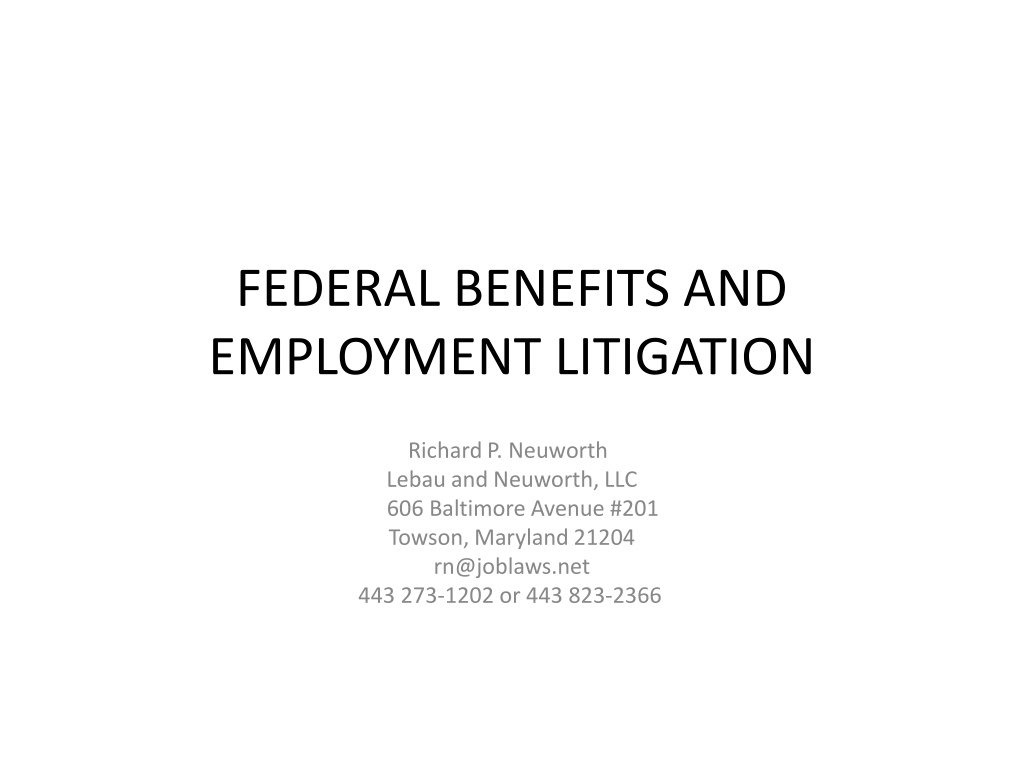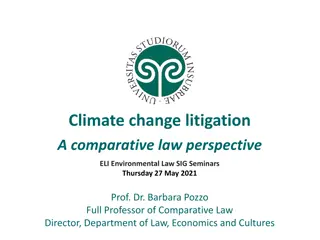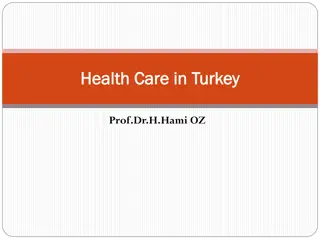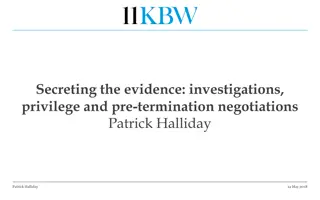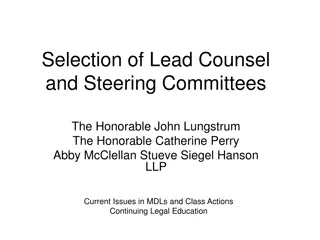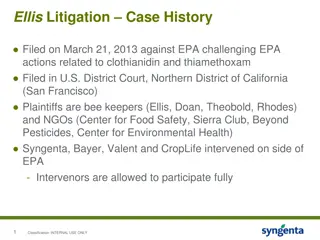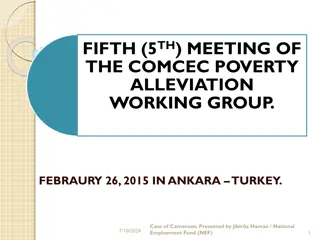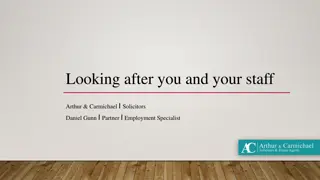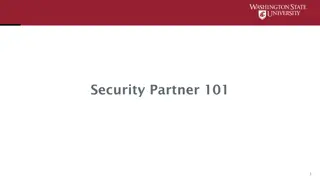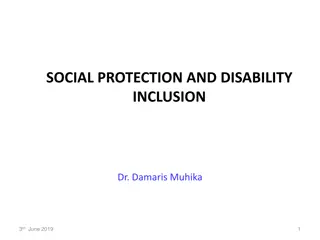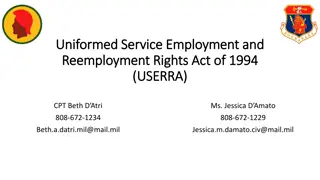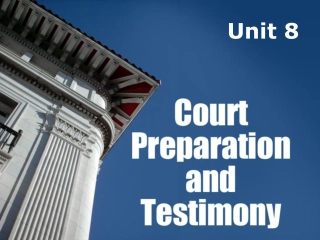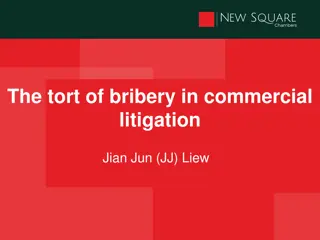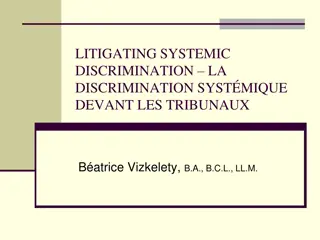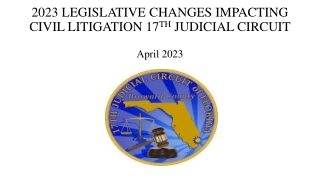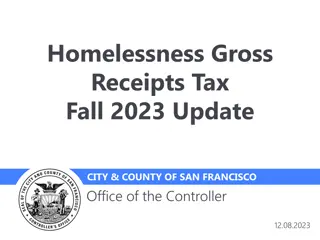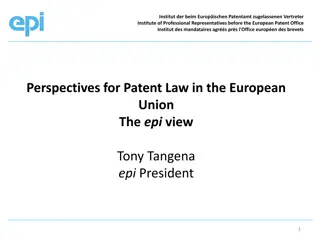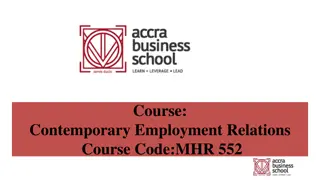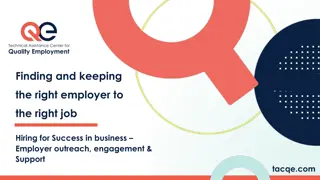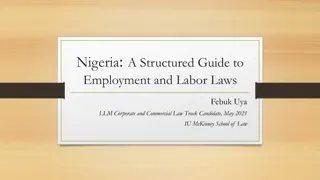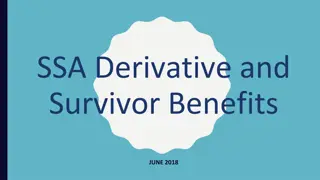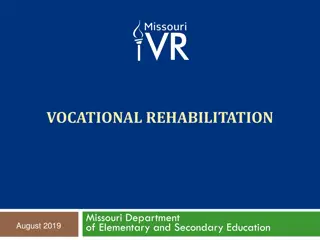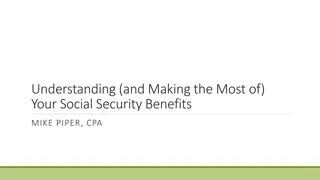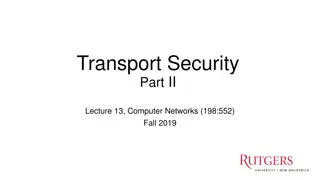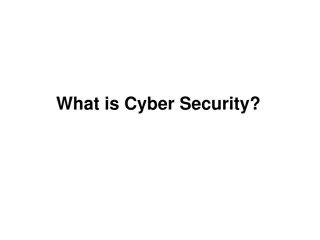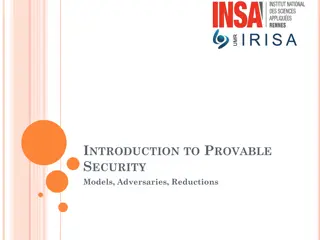Understanding Social Security Benefits in Employment Litigation
Employment litigation involving Social Security benefits can arise from various issues such as failure to collect FICA contributions, misclassification of employees, and impact on damages. Employees may face challenges in recouping FICA and Medicare contributions, with limited federal and state remedies available. Knowing how these benefits affect litigation is crucial for both employers and employees.
Download Presentation

Please find below an Image/Link to download the presentation.
The content on the website is provided AS IS for your information and personal use only. It may not be sold, licensed, or shared on other websites without obtaining consent from the author. Download presentation by click this link. If you encounter any issues during the download, it is possible that the publisher has removed the file from their server.
E N D
Presentation Transcript
FEDERAL BENEFITS AND EMPLOYMENT LITIGATION Richard P. Neuworth Lebau and Neuworth, LLC 606 Baltimore Avenue #201 Towson, Maryland 21204 rn@joblaws.net 443 273-1202 or 443 823-2366
Federal Benefits That Affect Employment Litigation Social Security (regular benefits) Social Security (disability benefits) Medicare (health insurance program) Medicaid (health insurance program) Affordable Care Act of 2010 (health insurance program)
Social Security Regular Benefits Accessible to individuals that have contributed the minimum amount of FICA contributions for ten (10) years. Are 62 years or older. From age 62-66, if one works and collects Social Security benefits, the benefits will be offset based on a 2 to 1 reduction for earned income over $18,960 in 2021 (and subject to future COLA increases each year). At age 66, normal retirement age currently (age 67 for those born from 1960 on, it is 67), if one works, one can earn $50,250 subject to a 3 -1 reduction for all earned income above that amount. At age 67 and upwards, no earnings limit currently.
How Social Security regular benefits affect employment litigation Issues in employment litigation: Employer failure to collect FICA contributions (Social Security and Medicare) from individual employees and send to appropriate federal government agency Misclassification of employees as independent contractors Social Security and unemployment benefits Mitigation of damages in case particularly economic losses Collateral source rule depending on individual state jurisdiction
Social Security regular benefits and impact on employment litigation What happens if employer refuses or fails to send FICA and Medicare taxes to government agencies? No, specific federal private cause of action for failing to send FICA and Medicare taxes to government agencies. See, McDonald v. S. Farm Bureau Life Ins. Co. 291 F. 3d 718 (11thCir. 2002); Umland v. Planco Financial Services 542 F. 3d 59 (3rdCir. 2008) What possible federal and state remedies are available to employees to recoup FICA and Medicare contributions? Possible claim under 26 U.S.C. 7434 seem unlikely. If employer reports all earned income on tax forms no cause of action under 26 U.S.C. 7434. See, Liverett v. Torres, 192 F. Supp. 3d 648 (E. D. Va. 2017) and subsequent cases. However, if employer does not report all earned income then possibly actionable. See Greenwald v. Regency Management, 372 F. 3d 266 (D.Md. 2019)
Social Security regular benefits and impact on employment litigation What possible state remedies to recoup FICA contributions: Breach of contract promising to pay all taxes due and owing in an employee handbook and failing to do so. See, Greenwald v. Regency Management, 372 F. 3d 266 (D. Md. 2019) Negligence or Accounting for failing to pay FICA contributions. Contra, Greenwald v. Regency Management, 372 F. 3d 266 (D. Md. 2019)(negligence)
Social Security regular benefits and impact on employment litigation What administrative remedies are available to employees to recoup lost FICA contributions? 26 U.S.C. 7623 Whistleblower rewards program which can be filed either anonymously or with the name of the worker IRS Form 8919 Recoup unpaid FICA contributions IRS Form SS-8 Determination of Status as either independent contractor or employee IRS Form 4852 Substitute for W-2 or other form that was filed on behalf of the employee
Social Security regular benefits and impact on employment litigation Social Security regular benefits have no effect on a worker obtaining unemployment benefits including the enhanced amount in 2020 and 2021. In other words, one can stack both benefits provided that someone applies for employment as required. Unemployment compensation does not count against $18, 960 amount that can be earned in 2021 and/or $ 50,520 in 2021. Social Security regular benefits may be subject to federal and state income taxes but not the entire amount. (85% maximum) If someone receives unemployment benefits even a reduced amount under the American Recovery Plan of 2021, it may increase the amount of Social Security benefits subject to taxation.
How Social Security Benefits Impact Employment Litigation Mitigation of economic damages based on lost and future wages is an important issue in many different types of employment cases. Is collecting Social Security regular benefits as a retirement supplement consistent with mitigation of economic damages? No it is not and could well be the subject of discovery. Individual that has filed any type of employment lawsuit and is seeking economic damages is still required to look for work. As noted previously, one can still work and receive Social Security regular benefits. The only constraints are possible reduction of benefits depending on the age of the recipient and how much is earned. Unemployment benefits have no effect whatsoever on Social Security regular benefits except possible tax liability.
How Social Security regular benefits impact employment litigation Social Security regular benefits offer two other possible ways to avoid a possible mitigation of damage argument which are: Social Security benefits received in one year may be re-paid to the Social Security Administration before the end of the year as long as the full payment is made in the same year. (The no interest or interest free loan) A married recipient may be able to collect benefits based on a spouse s earnings record if the recipient is 62 or older and has been married 10 years or more and the spouse s benefit are more than the recipient applying for benefits. (The spousal benefit rule)
How Social Security regular benefits impact employment litigation Collateral Source rule: In order to know whether or not the collateral source rule applies or does not in a particular employment case where a claimant is receiving Social Security benefits depends on three factors which are: Is the litigation in state and federal court? What is the nature of the employment law claim is it based on state or federal law? What is the venue of the litigation does the venue have a collateral source rule. If yes, it could apply to claims based on state employment law but not necessarily federal claims?
Social Security Disability Benefits Seven different Social Security disability programs. Principal one for discussion is (SSDIB) workers must have paid FICA in at least five (5) of the previous ten (10) years which is flexible. Individual has to certify under penalties of perjury that they will be disabled from all substantial gainful activity for twelve (12) months or longer due to a medical condition(s). Substantial gainful activity is working five (5) days a week and eight (8) hours a day. Alternative, is low income program (SSI) and same standard for disability about certification about substantial gainful activity,
Social Security disability benefits and employment litigation Issues in employment litigation: Social Security disability benefits and unemployment insurance benefits Social Security disability and disability discrimination litigation including ADAAA of 2008, Rehabilitation Act of 1973 and state disability discrimination statutes Social Security disability benefits affect on mitigation of damages and collateral source rule
Social Security disability benefits and employment litigation Can an employee collect unemployment benefits when applying for Social Security disability benefits? Yes, the Social Security Administration in theory does permit a potential recipient to apply for Social Security disability while receiving unemployment benefits. In fact, one can actually work and earn less than $1,000 a month and still in theory be eligible to collect Social Security disability benefits. However, there is a significant inconsistency or contradiction between applying for unemployment benefits which state that an applicant is ready, willing and able to work and an applicant that is applying for disability benefits under penalties of perjury alleging that he or she cannot perform any substantial gainful activity.
Social Security disability benefits and employment litigation There are several factors that must be weighed when considering whether or not to apply for disability benefits and receive unemployment benefits. There are three ways to qualify for Social Security benefits which are as follows: Grid Rules if the applicant is 50 years or older and cannot perform past relevant work and has no transferrable skills and is limited to unskilled work. Listing claimant s physical and/or mental condition is so severe that they automatically qualify for benefits. Inability to perform substantial gainful activity.
Social Security disability benefits and employment litigation Factors 1 and 2 (Grid Rules and Listings) receiving SS disability benefits would not preclude an applicant receiving unemployment benefits because there are jobs that the individual could perform on a fulltime basis. Factor 3 (Inability to perform any fulltime work) would preclude work on a fulltime basis. Social Security and unemployment both permit benefits to be awarded without reasonable accommodation Therefore, it is essential at the outset for representing individuals for both Social Security disability benefits and unemployment benefits to complete forms for both Social Security disability and unemployment benefits very carefully.
Social Security disability benefits and employment litigation Can an individual pursue both disability discrimination claims while pursuing and receiving Social Security disability benefits? In Cleveland v. Policy Management Systems Corp., 526 U.S. 795 (1999), the Supreme Court permitted an applicant to pursue an ADA claim and receive SS disability benefits provided that the claimant could demonstrate that they could perform the essential functions of the job with a reasonable accommodation.
Social Security disability benefits and employment litigation Factors for both plaintiffs and defendants counsel to consider regarding Social Security disability benefits and employment litigation: What information is contained on the Social Security disability form and medical records as to the nature of the claimant s medical condition and requests for accommodation? Is the plaintiff applying for the same job previously held or a different job? (Rehabilitation Act and some state disability discrimination statutes) permit accommodations to vacant positions that the applicant is qualified for with or without an accommodation other than the previous position held.
Social Security disability benefits and employment litigation Is the claimant applying for part time or full time gainful employment? How expensive would any reasonable accommodations be for this particular applicant? Does the applicant present a danger to himself or herself or other employees in the workforce? Is the applicant a qualified individual with a disability under the various disability discrimination statutes? What are the economic losses suffered by the plaintiff? Will the receipt of damages cause a loss of some disability benefits? (e.g. SSI benefits) Expert witness testimony including health care professionals and vocational experts.
Social Security disability benefits and employment litigation Mitigation of Damages - alleging economic losses in a disability discrimination case is very difficult. Why? Claimant has to demonstrate that they looked for work or actually worked while receiving Social Security disability benefits. It is estimated that only one (1) per cent of Social Security disability recipients go back to work. Under the Social Security disability program, however a claimant may work (a trial work period that lasts 9 months, earn unlimited amounts of money and stop Social Security disability benefits after that or earn less than substantial gainful activity which is approximately $1,300 per month and continue to receive benefits)
Social Security disability benefits and employment litigation Collateral source rule is a further complication concerning economic losses in a disability discrimination case. Some but not all states will offset the Social Security disability benefits against economic injury award. This is a particular problem concerning claims brought pursuant to state disability discrimination statutes. Federal disability discrimination litigation is problematical but some cases juries have been instructed to offset the Social Security disability benefits against economic losses while the benefits were being received. Emotional pain and suffering and punitive damages may be the only viable remedy and attorneys fees.
Medicare Health Insurance Program Available to individuals that paid Medicare tax for at least five (5) years and individuals age 65 and older. Accessible to individuals that qualified for Social Security disability benefits (not SSI), twenty nine (29) months after the onset date of disability until they reach age 65. At age 65, they are automatically enrolled in Medicare if satisfying the above criteria. Some individuals may be eligible for both Medicare and Medicaid based on low income. SSI is based on Medicaid not Medicare and has a different set of rules and regulations and does not cost anything to the applicant.
Medicare Health Insurance Program and issues in employment litigation Employer failure to send Medicare taxes to appropriate governmental agency Medicare Secondary Payer Act and potential double damage recovery and super liens owed to Medicare COBRA and Medicare Is Medicare eligibility a qualifying event under COBRA? False Claims Act litigation what type of Medicare claims are actionable in light of Escobar supra
Medicare health insurance and issues in employment litigation Medicare taxes not being sent to government authorities. (See previous slides) Medicare Secondary Payer Act, (MSP) 42 U.S.C. 1395 (y) (2) (b) permits private cause of action for double the amount of medical expenses that Medicare was forced to pay as a result of wrongful conduct by a defendant(s) that are either self- insured or have third party insurance coverage. E.g. O Connor v. Mayor and City Council of Baltimore, 494 F. Supp. 2d 372 (D. Md. 2007)
Medicare health insurance and issues in employment litigation What type of employment law claims may result in MSP potential liability? Disability discrimination resulting in loss of employer sponsored health insurance and medical bills paid by Medicare. Family and Medical Leave Act (federal or state) medical expenses not paid for that were legally required during the leave period or wrongful termination and paid by Medicare. Not providing health insurance under a group health plan under the Affordable Care Act of 2010 and subsequent bills paid by Medicare. Employer sponsored health insurance (ERISA) not paying for medical treatment and Medicare paid for the treatment. Workers compensation health insurer not paying for medical treatment and Medicare paid for the treatment.
Medicare health insurance and issues in employment litigation How does the MSP work? Claimant must first obtain a judgment in an employment case that becomes final. Claims on appeal are not final. Once judgment is final in the underlying employment case, the cause of action under the MSP accrues and is brought against either the insurer or self-insurer. Settlements of cases rarely will give rise to an action under the MSP because employer-insurers will have the appropriate provision in a settlement agreement barring any action under the MSP.
Medicare health insurance and issues in employment litigation Under COBRA (private health insurance offered by private employers that have twenty (20) or more employees, one of the six qualifying events is becoming Medicare eligible whether or not through age or disability. COBRA s requirement that potential Medicare beneficiary must be notified in writing about their eligibility to elect Medicare coverage. The failure to offer COBRA coverage to a potential Medicare recipient within 44 days of the qualifying event may result in both a private cause of action for penalties of up to $110 dollars a day plus attorney fees and potential tax penalties as well.
Medicare Health Insurance and issues in employment litigation False Claims Act litigation based on improper payments by Medicare Two theories which are implied and express certification. See Universal Health Servs., Inc. v. Escobar, 136 S.Ct. 582 (2015) Medicare has numerous regulations that are not potential violations that are actionable under state or federal false claims act. The only type of claims that are actionable involve payment of medical expenses by the Center for Medicare and Medicaid Services.
Medicaid Joint State and Federal Health Insurance Program Financial eligibility tests for joint state and federal program. Affordable Care Act of 2010 expanded eligibility to qualify for Medicaid in those states that adopted the program. Liens on medical expenses that were paid as part of a case not necessarily limited to personal injury cases.
Medicaid and Issues in Employment Litigation Issues with respect to employment litigation: Continued eligibility for health insurance program depending on the terms of settlement of employment case False Claims Act litigation depending on jurisdiction state and federal False Claims Act and which cases are actionable
Medicaid and Issues in employment litigation Medicaid is a lifeline for many low wage workers and was expanded as part of the ACA originally and by referendum in many other states since its passage in 2010. Any settlement agreement in employment litigation needs to be carefully checked to insure that it will not disqualify the claimant from continued health insurance coverage through Medicaid which is free to the claimant. Furthermore, any medical expenses that were paid by Medicaid may have to be paid back depending on the nature of the settlement and/or judgment in a particular employment case. Failure to pay back Medicaid liens may result in disciplinary action against attorneys and disqualification of client for continued benefits.
Medicaid and issues in employment litigation Medicaid claims are a frequent source of false claims litigation at under both state and federal laws unlike Medicare which involves federal laws only. Many states adopted rules concerning false claims act after passage of a federal law in 2005. (Deficit Reduction Act of 2005) The same rules apply about the implicit and explicit certification as previously set forth in Escobar supra
Affordable Care Act of 2010 Employees that work for employers that have 50 or more employees (employer mandate) Employees not necessarily required to work up to 40 hours a week but rather 30 or more Employer that has franchises with common management policies may be combined together to reach 50 employees Employer must either provide health insurance that meets requirements of the statute or pay a certain amount to employee(s) so that they can obtain health insurance coverage in the individual health insurance market place. California v. Texas Supreme Court decision whether group mandate for health insurance coverage is invalid.
Affordable Care Act of 2010 and employment litigation issues What happens if an employer that meets ACA requirements fails to offer health insurance coverage under the ACA or health insurance that does not meet the requirements of the ACA? What causes of action may be brought under the ACA or ERISA for discriminatory treatment by denial of health insurance coverage for specific procedures?
Affordable Care Act of 2010 and issues in employment litigation What happens if an employer fails to comply with the group mandate and offer health insurance coverage? Failure by employer to offer any health insurance coverage and employer has more than 20 or more employees COBRA and its penalties Private cause of action by employee for overpayment of wages under 26 U.S.C. 7434 Potential whistleblower claim under 26 U.S.C. 7623 Potential claims under state law as well for accounting (question of preemption by federal law)
Affordable Care Act of 2010 and issues in employment litigation Discrimination provisions in Affordable Care Act are rarely used: (Section 1550 of Affordable Care Act) Exception to rarely used provisions providing coverage for transgender sex changes. Current administration s regulations require health insurance coverage. Other cause of action is based on ERISA concerning retaliation such as termination and other disciplinary measures to prevent health insurance coverage. (E.g. Marin v. Dave and Buster s Inc. et.al. 159 F. Supp. 3d 460 (S.D. N.Y. 2016)allegedly terminating employees so that it could get under the 50 person requirement to offer health insurance coverage).
